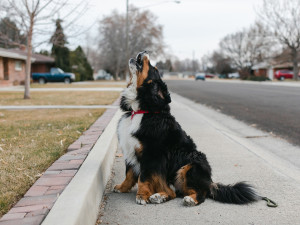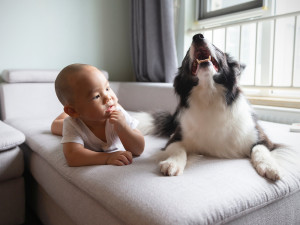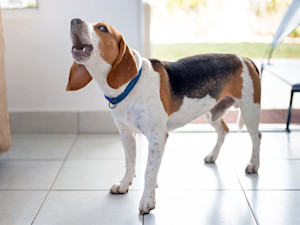Why Does Your Dog Howl at Night?
It’s funny at first… until it ruins your sleep.
In This Article:
Why Do Dogs Howl at Night? Behavioral Reasons Dogs Howl at Night Medical Reasons Dogs Howl at Night How to Calm a Night Howler
Is your dog turning into a furry opera singer the moment the moon rises? Nighttime howling is one of the most mystifying and occasionally maddening behaviors pet parents face. A 2023 survey by Rover found that nearly 45 percent of pet parents say their dog howls at least once during the night, sometimes scaring them awake.
But why does it happen? Is it a call to the wild, a sign of distress, or something medical?
The answer lies in a mix of behavioral and physical reasons, and often, a bit of both. Understanding the motivation behind the midnight howl can help you address it without frustration (and without waking the neighbors).
Dr. Carling Metajka, a veterinarian based in Calgary, Alberta, states, “There’s usually a message when dogs are howling in the middle of the night. It could be something emotional, physical, or just communication, but it’s rarely random.”
How much do you spend on your pet per year?
Why do dogs howl at night for no reason?
My dog started howling at night for no reason, or so I thought. Whether your dog is howling at night in a crate or even while sleeping, this could stem from anxiety, pain, or reacting to critters outside. I learned that it wasn’t just noise — it was communication. If your dog, like mine, is howling at night, don’t ignore it. Understanding why dogs howl at night while sleeping could reveal what they need from you.
Behavioral reasons why dogs howl at night
Dogs are descendants of wolves, and vocalizations have always been essential to their communication. However, unlike a quick bark or playful growl, howling is more primal and intentional.
Here’s what it may mean when your dog howls after dark.
Territorial marking
In the wild, wolves howl to signal their territory, kind of like putting up a “no trespassing” sign using their voices. Domestic dogs carry this instinct, even if they don’t have a sprawling forest to claim. If your dog hears another dog in the distance or notices a stranger walking past your home, that nighttime howl may be their version of, “Back off.”
This is especially common in breeds known for guarding or herding instincts, such as German Shepherds and Huskies, as well as small-but-vocal breeds like Chihuahuas.
Attention-seeking
Once a dog realizes that howling earns them your attention — even if you’re yelling for them to stop — they may keep doing it. To your dog, even negative attention is good attention.
Nighttime is also when humans typically wind down, and dogs, being social creatures, may not understand why you’re ignoring them. If they’re understimulated or bored, they might have late-night concerts to see if you’ll join the show.
Distress
Dogs experiencing anxiety, especially distress over separation, may howl out of panic or emotional discomfort. Night can trigger these feelings because the house is quiet, their humans are unavailable, and shadows may spook them.
If your dog is crate-trained or sleeping in a separate room, the distance could spark feelings of abandonment, especially if they’re used to being close to you during the day.
Signs that this is the cause may include pacing before howling, destructive behavior before or after howling, or attempts to break out of confined spaces, like a kennel or pet room.
Pack separation anxiety
Dogs are pack animals. When wolves are separated from their packs, they howl to reconnect. Your dog may be doing the same, trying to locate you, even if you’re down the hall.
This is more likely if your dog is newly adopted, sleeping alone for the first time, or has recently experienced a significant shift in their routine (such as a new baby, household move, or family vacation).
Excitement
Sometimes, howling isn’t about fear or need — it’s about fun. Just like some humans whistle when they’re happy, some dogs howl when they’re amped up. Did a squirrel run across the backyard? Time to howl. Did the cat jump off the bed? Howl time.
This excitement can snowball, especially if there are other dogs in the neighborhood howling back. It’s a canine group chat, and your dog is the loud friend who loves voice notes.
Environmental stimuli
Dogs often respond to external sounds we barely notice. Sirens, fireworks, distant barking, even the whine of a phone charging. These noises can trigger a howling response.
Dogs with strong hearing, such as Hounds, are more likely to howl at ambient noises, mainly if they occur during the quiet of the night.
Medical reasons why dogs howl at night
If your dog’s howling starts suddenly, increases in intensity, or seems to occur alongside physical symptoms, a medical issue could be the culprit. Dogs aren’t always great at showing pain, so vocalization becomes one of their few outlets to let you know something’s wrong.
Pain
One of the most overlooked causes of nighttime howling is simple discomfort. Just like humans groan in their sleep with aches and pains, dogs may vocalize their discomfort due to arthritis, dental pain, digestive upset, or recent injuries.
Older dogs, in particular, may experience joint pain at night as they settle into rest positions or wake to shift their weight.
Aging
Unfortunately, as dogs age, they become prone to canine cognitive dysfunction syndrome (CDS), known as doggy dementia. This is common in senior dogs and is often compared to Alzheimer’s in humans. It causes confusion, memory loss, and changes in sleep patterns.
One key sign of CDS is nighttime vocalizations. Affected dogs may wake up disoriented and howl in confusion, sometimes pacing or staring at walls. If your senior pup’s howling has increased, it’s worth discussing this with your vet.
Needing to go outside
Not all howling is dramatic. Sometimes, your dog needs to pee. If your dog is whining or howling at night, especially after eating or drinking close to bedtime, it could simply be a potty alert.
Puppies and older dogs may have a harder time holding it in overnight. Similarly, dogs with urinary tract infections or gastrointestinal issues may need to go outside more often.
Loneliness or separation anxiety
Dogs can get lonely, too. If your pup is the only pet in the home, and you’re asleep, the lack of social stimulation can feel unsettling, especially in the quiet stillness of the night.
Add in unfamiliar shadows or weird noises, such as the wind or raccoons digging through outdoor trash cans, and suddenly your dog may feel like they’re starring in a horror movie. And like any good character in a thriller, they’ll scream (or howl) for help.
How to calm a night howler
Not every nighttime howler needs professional intervention. In many cases, a few changes at home can dramatically reduce howling.
1. Tire them out before bed
A dog with leftover energy at night is more likely to find creative outlets, like howling. Try a long walk, a game of tug, a snuffle mat, or a puzzle toy to keep your pup mentally occupied and physically exhausted.
2. Offer comforting scents or sounds
White noise machines, heartbeat toys, or calming pheromone diffusers can help ease nighttime anxiety. A T-shirt that smells like you and has been placed in their bed can work wonders.
3. Create a cozy sleep environment
Some dogs sleep better in a quiet crate or covered den. Others do better when they can see you. Test what works for your dog. The goal is to reduce feelings of isolation or vulnerability.
4. Feed them, and take them out to potty, before lights out
This sounds basic, but dogs can’t sleep well if their needs aren’t met. Avoid large meals before bed, and ensure they’ve had a final potty break before bedtime.
5. Don’t reward the howl
This one’s tough, especially at 3 a.m. However, rushing to comfort a howling dog can teach them that howling equals attention. Unless you suspect they need to go outside or are in pain, wait until they’re quiet to be engaging.
When to seek expert help
Occasional howling is normal. However, if it’s happening nightly, disrupting your household, or causing visible stress to your dog (or neighbors), call a professional.
Here are a few signs that it’s time to call your vet or a behaviorist.
The howling is new or sudden.
Your dog also shows signs of pain, limping, or behavior changes.
The howling is paired with pacing, panting, drooling, or destruction.
Your dog is more than seven years old and is showing signs of disorientation.
The howling is interfering with your sleep and mental health.
A veterinarian can help identify if your dog’s nighttime howling is due to a medical cause. They can rule out underlying conditions (such as cognitive decline, arthritis, or gastrointestinal discomfort) through diagnostic tools, like bloodwork or X-rays. If anxiety or pain is a factor, your vet can prescribe medications or suggest additional care strategies to improve your dog’s comfort and sleep quality.
An animal behaviorist, meanwhile, will focus on the emotional and behavioral triggers behind the howling. They can help pinpoint whether your dog’s vocalizations stem from boredom, separation anxiety, or environmental stress. Through tailored strategies such as crate training, desensitization, and structured enrichment routines, a behaviorist can teach you how to respond appropriately, reducing howling without unintentionally encouraging it.
Bottom line
Nighttime howling can be frustrating, especially when you’re short on sleep, but it’s rarely meaningless.
Whether your dog is voicing excitement, anxiety, or discomfort, their howling is communication. Your job is to decode the message.
With some observation, a few tweaks to their routine, and support from your vet or a canine behaviorist, your dog’s night songs can fade into sweet, silent dreams. Or at least become less of a performance.
References
“Find a Consultant.” International Association of Animal Behavior Consultants (IAABC), m.iaabc.org/consultantsopens in new tab.
“Howling.” ASPCA, www.aspca.org/pet-care/dog-care/common-dog-behavior-issues/howlingopens in new tab.
Matejka, Carling. Understanding Why Dogs Howl at Night: Causes and Solutions. Dosty, dosty.co/en/blog/article/understanding-why-dogs-howl-at-night-causes-and-solutionsopens in new tab.
“Why Do Dogs Howl?” VCA Animal Hospitals, vcahospitals.com/know-your-pet/why-do-dogs-howlopens in new tab.










